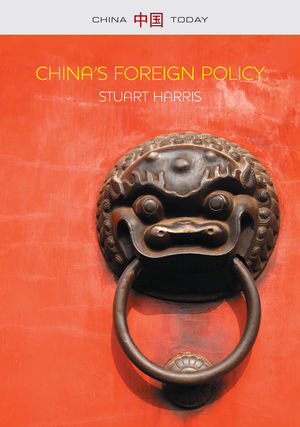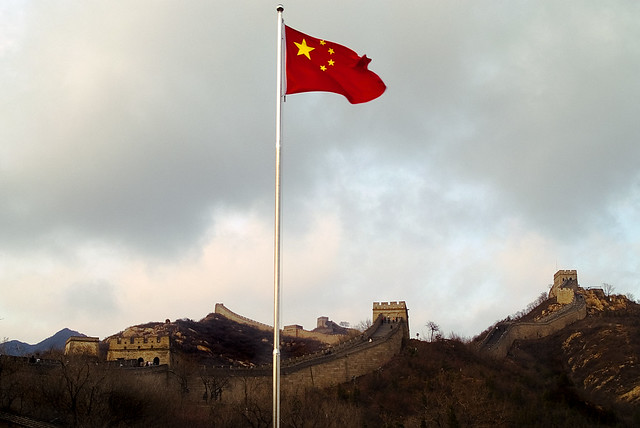In this book, Stuart Harris explores China’s foreign policy and its motivations, focusing in particular on the extent to which China will co-operate with the West in years to come. He considers what factors, international or domestic, will influence the foreign policies being shaped in Beijing, including how far the Chinese regime will adhere to existing global norms and the evolving international system. Jeff Roquen is unconvinced and would like to have seen a more balanced analysis.
 China’s Foreign Policy. Stuart Harris. Polity. 2014.
China’s Foreign Policy. Stuart Harris. Polity. 2014.
When China surpasses the United States as the largest economy in the world in the next few months, it will end more than a century of American dominance in trade. Although relatively stagnant growth and widespread indigence defined Communist China under Mao Zedong (r. 1949-1976), its recent meteoric economic expansion and increasingly assertive behaviour have raised both questions and alarms in capitals around the world. In China’s Foreign Policy, Stuart Harris attempts to refute politicians, policymakers, and pundits who deem China a “threat”. Although well-written, it is this reviewer’s opinion that his monograph contains a series of contradictory assertions and can be interpreted as mischaracterizing the nature and objectives of China’s regime.
In the preface, Harris applauds and adopts a call by eminent British historian Michael Howard to make empathy the basis of international relations analysis. Rather than a form of realpolitik, Beijing, Harris claims, approaches the world through the cultural lens of Confucianism and maintains an inchoate foreign policy. Harris declares that “In China, as elsewhere…foreign policy is contingent, often simply responsive to events and based on incomplete information” (p. 3). Yet, casting China’s international engagement as ad hoc and reflexive belies both its historical record and current mode of behaviour.
After depicting the government as a byzantine bureaucracy devoid of a power centre at the outset of Chapter Two on “Foreign Policy Decision Making,” Harris reverses course only a few pages later and not only declares the military “a core pillar” of the state but also describes the relationship between the armed forces and the Chinese Communist Party as “symbiotic” to a significant degree – while further (and correctly) noting that the “main function” of the military “is to protect the Party, not the nation” (p. 35). Over the course of the next two chapters entitled “China, the World and the International System” and “Insecurity and Vulnerability” respectively, China is portrayed as a benign power without a grand strategy and fearful of American “intentions”. When judged by how Beijing projects its power in Africa, Asia, and across the globe, however, the sanguine analysis of China offered by Harris becomes somewhat untenable.
While conceding the role of resource-acquisition as a primary factor in its foreign policy, Harris nevertheless fails to appreciate China’s Machiavellian strategy for obtaining the oil and minerals essential to its burgeoning industrial economy. In 1989, military officer Omar al-Bashir and a coterie of radical Islamists overthrew Sudan’s head of state and imposed a draconian form of Sharia law. Subsequently, his regime brutally repressed indigenous ethnic groups, subjugated women, and sponsored Islamic terrorists – including providing sanctuary to Osama Bin Laden. As a result, the United States government imposed economic sanctions, and Chevron, along with other Western oil companies, ceased operations in the country. Sensing opportunity, the China National Petroleum Corporation inked an agreement with Khartoum and took over the production and distribution of oil one year later. While China gained access to Sudan’s coveted petroleum reserves, Bashir used the windfall profits to purchase arms from Beijing and Moscow to mount a military campaign against the non-Muslim, religiously syncretic Fur people of Darfur.

From 2003-2006, the Sudanese Armed Forces and their allies the Janjaweed militia raped, pillaged, and murdered 400,000 Darfurians in the first genocide of the twenty-first century. How did Beijing respond? It continued to support Bashir by diluting punitive United Nations Security Council resolutions and maintaining (if not expanding) economic and diplomatic relations with Khartoum. In its pursuit of oil and power, China has forged links with numerous authoritarian regimes around the world at the expense of human rights – hardly the characteristic of a “vulnerable” state.
Although Harris briefly covers China’s recent naval forays into disputed waters, he ignores their geopolitical motivations. Over the past several years, Beijing has aggressively contested Japanese claims to the Senkaku Islands (referred to as the Diaoyu Islands in China) in the East China Sea and challenged other ASEAN nations over the Paracel Islands and Spratly Islands in the South China Sea in a bid to control potential sources of energy. Whereas the area around the Senkakus likely contains both major gas and significant petroleum deposits, the South China Sea as a whole may possess in excess of 200 million barrels of oil – of which only Venezuela and Saudi Arabia have more proven reserves. Instead of continuing negotiations, Beijing has ratcheted up tensions in the region by drilling in diplomatically unresolved parts of the South China Sea, provocatively dispatching a fleet of ships near the Senkaku/Diaoyu Islands, and consistently making dubious historical claims to support its emboldened posture.
Beyond limiting China’s forward-deployed navy to little more than a passing reference, Harris also minimizes the recrudescent alliance between Beijing and Moscow. Since launching the Shanghai Cooperation Organization (SCO) in 1996 (then known as the Shanghai Five) with Russia as a co-sponsor, the two nations have significantly increased bilateral trade, coordinated their positions in the UN Security Council, combined to alter US plans on missile defense in Europe, and conducted a range of joint-military exercises since 2005 – including recent ones in the Yellow Sea (2012) and the Sea of Japan (2013).
When British Prime Minister David Cameron indirectly accused China and Russia for having “aided and abetted” the tyrannical regime of Bashar al-Assad of Syria in the UN General Assembly on 26 September 2012, he was ultimately identifying the dark realities of the new Beijing-Moscow nexus of power in the schema of twenty-first century international relations. Despite Assad’s heinous crimes against humanity, which include using chemical weapons against civilians and torturing women and children, Moscow continues to supply Syria with armaments and diplomatic cover to protect its naval base at Tartus on the Mediterranean. In unison with its anti-Western ally, China has joined Russia to successfully thwart attempts by the UN to impose punitive measures against Damascus.
After opening his study with an appeal for empathy toward China, Harris closes the book with a diatribe against U.S. defence policy and exposes his lack of objectivity. Although China’s Foreign Policy may serve as a useful corrective to accounts wholly biased against Beijing, it ultimately proves tendentious by omitting or understating China’s frequent military provocations, its flagrant violations of international law, and its unscrupulous alignment with dictatorships, including North Korea.
Two particularly accomplished monographs offer a more balanced and insightful analysis, and can be recommended to interested readers: Chinese Foreign Relations: Power and Policy Since The Cold War by Robert G. Sutter and The Party: The Secret World of China’s Communist Rulers by Financial Times journalist Richard McGregor. Moreover, the rigorously researched assessments of China’s flagrant and ongoing disregard for human rights, published annually by Amnesty International, Human Rights Watch, and Freedom House, should not be ignored by anyone interested in the role and behaviour of China in world affairs.
Rather than the thoroughly corrupt and despotic regime in Beijing, empathy ought to be reserved for the still-embattled people of Darfur and the more than three million Syrian refugees struggling to survive.
Jeff Roquen is an independent writer and a PhD candidate in the Department of History at Lehigh University in Pennsylvania (USA).







